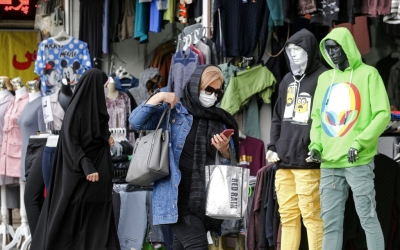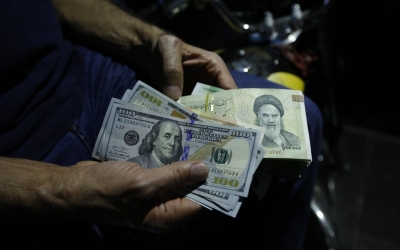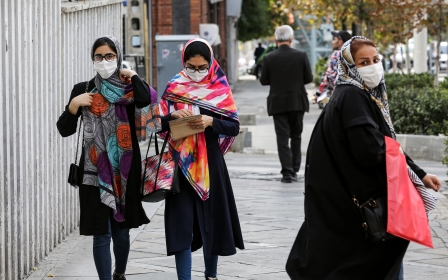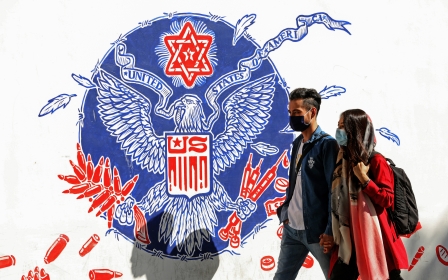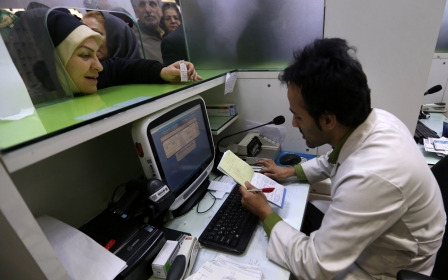Covid-19: Iran's health system stands on last legs as virus rages on
Since February, when Iran officially announced its first coronavirus cases, the country has been battling the pandemic with little success.
Not only has it become the country in the Middle East worst affected by Covid-19, with more than 800,000 Iranians infected, the health ministry confirmed on Friday that the death toll from the outbreak had risen to 47,095.
On 21 November, Iranian authorities launched a new set of restrictions to stem the country's third wave of its coronavirus outbreak. The measures included closing non-essential businesses and travel bans until further notice, and a nightly curfew from 9pm to 4am.
The move came after months of calls by a growing number of local provincial authorities and experts to impose a full lockdown in metropolises like Tehran - where 50 percent of Iran's infections and fatalities have been reported - as the only option to curb the deadly virus.
November has been the deadliest month since the outbreak began. By 23 November, over 10,300 people had died of the virus.
The sharp spike prompted the country's health minister, Said Namaki, to warn that Iran was witnessing a "corona explosion" and caution that daily fatalities would reach four-digit numbers if restrictions were not fully implemented or observed.
These restrictive measures, Namaki said, would be the last line of defence for Iran's healthcare system.
'Exhausted' healthcare system
Dr Mahdiar Saeedian is a physician and a medical activist in Iran's northeastern city of Mashhad. He is among a large number of experts who believe that anything short of a full lockdown would not be enough to curb the spread of the virus in the country.
"We have missed two golden chances to curb the virus. The first was the two-week holidays of Nowruz [the Persian new year which started on 20 March], and the second was during the month of Ramadan [from April to May]," Saeedian told Middle East Eye.
"Those were the times when most businesses were working either fewer hours or had much lower demand. But due to mismanagement, those important periods were missed, and we are now witnessing this devastating situation as a result," he said.
The impact of the virus is felt acutely in the healthcare community. According to official statistics, over 300 medical staff in Iran's healthcare system have died due to Covid-19.
'In terms of equipment and staff, we are facing serious shortages again, and staff are being forcing to work longer hours but with no significant financial gain'
- Iranian nurse
On 10 October, Alireza Zali, head of the coronavirus control working group in Tehran, said more than 20,000 nurses across Iran had been infected with coronavirus. However, a tally by union activists said over 400 healthcare workers had lost their lives so far, pointing to possible underreporting by authorities.
According to Saeedian, healthcare workers, especially those working in hospitals, are suffering from "physical and psychological exhaustion" and he warned that if the situation continues unabated, "the healthcare system will collapse".
A similar viewpoint has been expressed by a growing number of experts in Iran, who agree that exhaustion resulting from longer work hours and lack of standard protective gear have significantly increased healthcare workers' vulnerability.
Payam Tabarsi is the head of the infectious disease department at Masih Daneshvari hospital, one of the main centres treating Covid-19 patients in Tehran. He warned in September of the danger of a "sudden collapse of the medical system" due to extended shifts and mental pressures on healthcare staff.
"They give us three simple surgical masks for a 13-hour shift, when each of these masks is only good for two hours," a nurse working in one of Iran's northern provinces told MEE on condition of anonymity.
"In terms of equipment and staff, we are facing serious shortages again, and staff are being forced to work longer hours but with no significant financial gain," she said.
The bite of US sanctions
Aside from Iran's domestic management of the virus outbreak, which has been considered poor across the board, the unprecedented set of sanctions imposed by Washington on Tehran has affected the way Iran handles the pandemic.
While food, health, and medical-related goods are exempt from the US embargoes on paper, facts on the ground have shown otherwise, as many foreign companies and banks refrain from any dealings with Iran out of fear of being penalised by the US.
"No one can deny the major role US sanctions play in this humanitarian crisis. We are having serious problems in importing drugs and equipment needed for special illnesses and cancer patients," said Saeedian.
The same situation has happened in regard to influenza immunisation, he said, as the government was able to import only a limited number of vaccines, which were mostly distributed among frontline healthcare workers.
Washington's anti-Iran measures under the administration of outgoing President Donald Trump have not been limited to just sanctions. The US has also blocked Iran's request for a $5bn emergency loan from the World Bank, further kneeling on Tehran's financial throat after it already lost access to billions in revenues from oil and other goods.
The Iranian government was already battling with high inflation and unemployment along with a significant budget deficit before the pandemic.
With existing nationwide dissatisfaction over dire economic conditions and widespread corruption on the rise, Iranian authorities have for long resisted any major lockdown or restrictions out of fear of triggering social unrest.
"Officials in the health ministry never had the necessary authority to manage the crisis in the way they should, at the cost of ordinary people and healthcare workers losing their lives," Saeedian said.
'No one can deny the major role US sanctions play in this humanitarian crisis'
- Dr Mahdiar Saeedian, Masshad
"The security and economic factors coupled with political infighting have led to where we are now."
The situation became clear after Reza Malekzadeh, the deputy health minister, resigned from his post just a day before planned restrictions were to be imposed, blasting the minister for weak management and ignoring health experts, which had led to "significantly high human casualties".
With Covid-19 fatalities on the rise at a rapid pace, there's a growing demand for new healthcare recruits as well as upgrades of the worn-out medical equipment such as respiratory systems and ICU beds.
Those on the frontline just want to feel a little bit safer in their fight against the virus.
"Because of US sanctions, some of our colleagues were not able to receive the influenza vaccine, since the government couldn't import enough of them," the nurse in northern Iran told MEE.
"I hope the same thing doesn't happen again when the coronavirus vaccine is developed and distributed."
Middle East Eye propose une couverture et une analyse indépendantes et incomparables du Moyen-Orient, de l’Afrique du Nord et d’autres régions du monde. Pour en savoir plus sur la reprise de ce contenu et les frais qui s’appliquent, veuillez remplir ce formulaire [en anglais]. Pour en savoir plus sur MEE, cliquez ici [en anglais].


